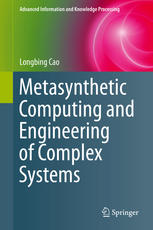

Most ebook files are in PDF format, so you can easily read them using various software such as Foxit Reader or directly on the Google Chrome browser.
Some ebook files are released by publishers in other formats such as .awz, .mobi, .epub, .fb2, etc. You may need to install specific software to read these formats on mobile/PC, such as Calibre.
Please read the tutorial at this link: https://ebookbell.com/faq
We offer FREE conversion to the popular formats you request; however, this may take some time. Therefore, right after payment, please email us, and we will try to provide the service as quickly as possible.
For some exceptional file formats or broken links (if any), please refrain from opening any disputes. Instead, email us first, and we will try to assist within a maximum of 6 hours.
EbookBell Team

4.4
42 reviewsProvides a comprehensive overview and introduction to the concepts, methodologies, analysis, design and applications of metasynthetic computing and engineering. The author: • Presents an overview of complex systems, especially open complex giant systems such as the Internet, complex behavioural and social problems, and actionable knowledge discovery and delivery in the big data era. • Discusses ubiquitous intelligence in complex systems, including human intelligence, domain intelligence, social intelligence, network intelligence, data intelligence and machine intelligence, and their synergy through metasynthetic engineering. • Explains the concept and methodology of human-centred, human-machine-cooperated qualitative-to-quantitative metasynthesis for understanding and managing open complex giant systems, and its computing approach: metasynthetic computing. • Introduces techniques and tools for analysing and designing problem-solving systems for open complex problems and systems. Metasynthetic Computing and Engineering uses the systematology methodology in addressing system complexities in open complex giant systems, for which it may not only be effective to apply reductionism or holism. The book aims to encourage and inspire discussions, design, implementation and reflection of effective methodologies and tools for computing and engineering open complex systems and problems. Researchers, research students and practitioners in complex systems, artificial intelligence, data science, computer science, and even system science, cognitive science, behaviour science, and social science, will find this book invaluable.